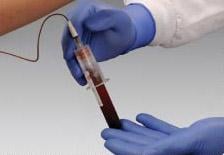
September 1, 2009 – CardioDx said last week it successfully completed its multicenter validation study for Corus CAD, the first gene expression test to quantify the likelihood of obstructive(1) coronary artery disease (CAD) in patients with stable chest pain.
The company expects to present results of the study by the end of 2009, and will publish the results in 2010. Following completion of the validation study, CardioDx has made Corus CAD available in nine states initially, with broader availability expected in 2010. The test is now available in Kentucky, Maryland, Illinois, Washington, Wisconsin, Minnesota, North Carolina, Texas and Arizona. Patient samples are processed in Palo Alto at CardioDx's CLIA-certified laboratory.
Currently, the presence of obstructive CAD in patients with stable chest pain is most often evaluated through functional and/or anatomical assessment of the heart and its vessels, including stress echocardiography, myocardial perfusion imaging, and computed tomography angiography. However, despite advances in imaging technology, these techniques can be subjective and challenging for cardiologists, because of variation in presenting symptoms and each patient's unique disease characteristics. The company said Corus CAD provides unique genomic information about an individual's disease processes at the molecular and cellular levels. When this information is combined with standard clinical assessments, physicians obtain a more complete picture of their patient's disease and can better individualize patient care.
Corus CAD is a clinically validated genomic test that integrates the expression levels of 23 genes and other patient characteristics to assess obstructive CAD. The test is intended to be used in an outpatient setting with clinically stable, nondiabetic patients who present with chest pain or who have a high risk of coronary artery disease, but without previously diagnosed myocardial infarction or prior revascularization procedure. Corus CAD is convenient and safe, and only requires a standard blood draw procedure. The test yields an objective result delivered to the physician in the form of a numeric score that quantifies the likelihood that a patient with stable chest pain has obstructive CAD.
The prospective, nationwide, multicenter clinical study, PREDICT (Personalized Risk Evaluation and Diagnosis in the Coronary Tree – www.clinicaltrials.gov) sought to determine whether a gene expression test could be developed to identify obstructive CAD in patients with stable chest pain. The company has collected more than 2,800 patient samples in PREDICT from more than 40 clinical sites in the United States as of April 2009. Trial results and the Corus CAD validation data are expected to be presented toward the end of 2009.
For more information: www.cardiodx.com
(1) Obstructive CAD is defined as at least one atherosclerotic plaque causing greater than or equal to 50 percent luminal diameter stenosis in a major coronary artery (greater than or equal to 1.5 mm lumen diameter) as determined by invasive quantitative coronary angiography.


 November 12, 2025
November 12, 2025 









